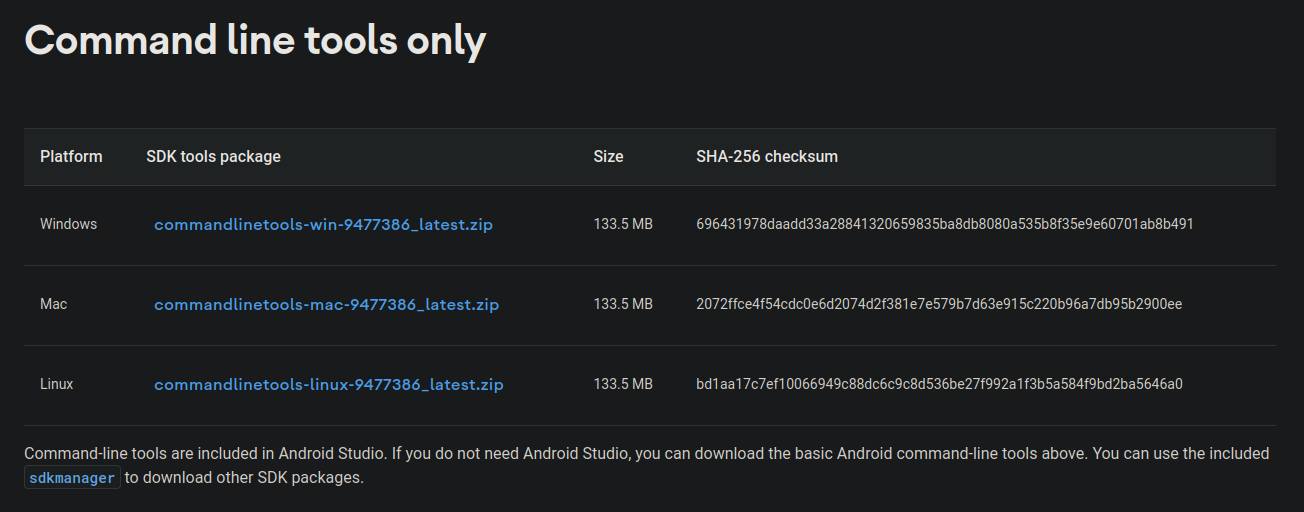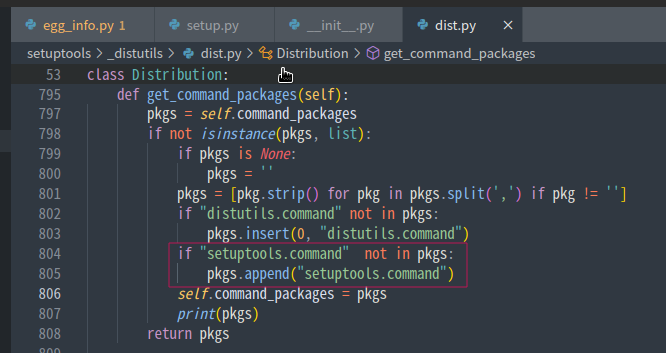官方教程在此:https://www.qt.io/blog/taking-qt-for-python-to-android
寥寥几句,其实不少坑。凭回忆写的,可能不是很全(无招胜有招)
仅支持 Linux 环境
QT 环境安装
从 http://mirrors.ustc.edu.cn/qtproject/official_releases/online_installers/ 下载在线安装器。
新版本的安装器(4.0.1-1 后)支持 --mirror 命令行参数。在命令行中执行安装器,添加 --mirror https://mirrors.ustc.edu.cn/qtproject 参数。例如 Windows 下执行当前目录的安装器的命令为 .\qt-unified-windows-x86-online.exe --mirror https://mirrors.ustc.edu.cn/qtproject;
有亿点大,装这些就行了(2.22G):

然后要安装 llvm
安装安卓开发环境
下载 Command line tools only 挂一个 我的下载链接
安装
#!/bin/bash
shopt -s extglob
if [ -z "$1" ]
then
echo "Supply path to commandlinetools-linux-*_latest.zip"
exit 1
fi
android_sdk=$(pwd)/android_sdk
mkdir -p $android_sdk
unzip $1 -d $android_sdk
latest=$android_sdk/cmdline-tools/latest
mkdir -p $latest
mv $android_sdk/cmdline-tools/!(latest) $latest
$latest/bin/sdkmanager "ndk;25.2.9519653" "build-tools;33.0.2" "platforms;android-31" "platform-tools"
cp -avr $android_sdk/cmdline-tools/latest $android_sdk/tools
export ANDROID_SDK_ROOT=“android_sdk”
export ANDROID_NDK_ROOT=“android_sdk/ndk/25.2.9519653”
cd pyside-setup/
pip install –r tools/cross_compile_android/requirements.txt
pip install –r requirements.txt 然后跑
python tools/cross_compile_android/main.py --plat-name=aarch64 --ndk-path=$ANDROID_NDK_ROOT --qt-install-path=第一步的QT安装位置 --sdk-path=$ANDROID_SDK_ROOT -v排错小妙招
因为官方的编译目录使用 tempfile.TemporaryDirectory() 创建,导致整个编译目录跑完就没了(是的,日志也没了)
如果你刚开始没多久就崩了,又找不到日志,可以使用我修改过的 main.py (不会删日志)
修改后
# Copyright (C) 2023 The Qt Company Ltd.
# SPDX-License-Identifier: LicenseRef-Qt-Commercial OR LGPL-3.0-only OR GPL-2.0-only OR GPL-3.0-only
import sys, os
import logging
import argparse
import tempfile
import subprocess
import stat
import warnings
from dataclasses import dataclass
from typing import List
from pathlib import Path
from git import Repo, RemoteProgress
from tqdm import tqdm
from jinja2 import Environment, FileSystemLoader
# Note: Does not work with PyEnv. Your Host Python should contain openssl.
PYTHON_VERSION = "3.10"
@dataclass
class PlatformData:
plat_name: str
api_level: str
android_abi: str
qt_plat_name: str
gcc_march: str
plat_bits: str
def occp_exists():
'''
check if '--only-cross-compile-python' exists in command line arguments
'''
return "-occp" in sys.argv or "--only-cross-compile-python" in sys.argv
class CloneProgress(RemoteProgress):
def __init__(self):
super().__init__()
self.pbar = tqdm()
def update(self, op_code, cur_count, max_count=None, message=""):
self.pbar.total = max_count
self.pbar.n = cur_count
self.pbar.refresh()
def run_command(command: List[str], cwd: str = None, ignore_fail: bool = False,
dry_run: bool = False):
if dry_run:
print(" ".join(command))
return
ex = subprocess.call(command, cwd=cwd)
if ex != 0 and not ignore_fail:
sys.exit(ex)
if __name__ == "__main__":
parser = argparse.ArgumentParser(
description="This tool cross builds cpython for android and uses that Python to cross build"
"android Qt for Python wheels",
formatter_class=argparse.RawTextHelpFormatter,
)
parser.add_argument("-p", "--plat-name", type=str, required=True,
choices=["aarch64", "armv7a", "i686", "x86_64"],
help="Android target platform name")
parser.add_argument("-v", "--verbose", help="run in verbose mode", action="store_const",
dest="loglevel", const=logging.INFO)
parser.add_argument("--api-level", type=str, default="31", help="Android API level to use")
parser.add_argument("--ndk-path", type=str, required=True,
help="Path to Android NDK (Preferred 25b)")
# sdk path is needed to compile all the Qt Java Acitivity files into Qt6AndroidBindings.jar
parser.add_argument("--sdk-path", type=str, required=True,
help="Path to Android SDK")
parser.add_argument("--qt-install-path", type=str, required=not occp_exists(),
help="Qt installation path eg: /home/Qt/6.5.0")
parser.add_argument("-occp", "--only-cross-compile-python", action="store_true",
help="Only cross compiles Python for the specified Android platform")
parser.add_argument("-apic", "--android-python-install-path", type=str, default=None,
required=occp_exists(),
help='''
Points to the installation path of Python for the specific Android
platform. If the path given does not exist, then Python for android
is cross compiled for the specific platform and installed into this
path as <path>/Python-'plat_name'/_install.
If this path is not given, then Python for android is cross-compiled
into a temportary directory, which is deleted when the Qt for Python
android wheels are created.
''')
parser.add_argument("--dry-run", action="store_true", help="show the commands to be run")
args = parser.parse_args()
logging.basicConfig(level=args.loglevel)
pyside_setup_dir = Path(__file__).parents[2].resolve()
qt_install_path = args.qt_install_path
ndk_path = args.ndk_path
sdk_path = args.sdk_path
only_py_cross_compile = args.only_cross_compile_python
python_path = args.android_python_install_path
# the same android platforms are named differently in CMake, Cpython and Qt.
# Hence, we need to distinguish them
qt_plat_name = None
android_abi = None
gcc_march = None
plat_bits = None
dry_run = args.dry_run
# python path is valid, if Python for android installation exists in python_path
valid_python_path = True
if python_path and Path(python_path).exists():
expected_dirs = ["lib", "include"]
for expected_dir in expected_dirs:
if not (Path(python_path) / expected_dir).is_dir():
valid_python_path = False
warnings.warn(
"Given target Python, given through --android-python-install-path does not"
"contain Python. New Python for android will be cross compiled and installed"
"in this directory"
)
break
templates_path = Path(__file__).parent / "templates"
plat_name = args.plat_name
api_level = args.api_level
# for armv7a the API level dependent binaries like clang are named
# armv7a-linux-androideabi27-clang, as opposed to other platforms which
# are named like x86_64-linux-android27-clang
platform_data = None
if plat_name == "armv7a":
platform_data = PlatformData("armv7a", f"eabi{api_level}", "armeabi-v7a", "armv7", "armv7",
"32")
elif plat_name == "aarch64":
platform_data = PlatformData("aarch64", api_level, "arm64-v8a", "arm64_v8a", "armv8-a", "64")
elif plat_name == "i686":
platform_data = PlatformData("i686", api_level, "x86", "x86", "i686", "32")
else: # plat_name is x86_64
platform_data = PlatformData("x86_64", api_level, "x86_64", "x86_64", "x86-64", "64")
# clone cpython and checkout 3.10
# with tempfile.TemporaryDirectory() as temp_dir:
environment = Environment(loader=FileSystemLoader(templates_path))
temp_dir = Path('/tmp/下载/build_dir')
logging.info(f"temp dir created at {temp_dir}")
if not python_path or not valid_python_path:
cpython_dir = temp_dir / "cpython"
python_ccompile_script = cpython_dir / "cross_compile.sh"
logging.info(f"cloning cpython {PYTHON_VERSION}")
if not os.path.exists(temp_dir):
Repo.clone_from(
"https://github.com/python/cpython.git",
cpython_dir,
progress=CloneProgress(),
branch=PYTHON_VERSION,
)
if not python_path:
android_py_install_path_prefix = temp_dir
else:
android_py_install_path_prefix = python_path
# use jinja2 to create cross_compile.sh script
template = environment.get_template("cross_compile.tmpl.sh")
content = template.render(
plat_name=platform_data.plat_name,
ndk_path=ndk_path,
api_level=platform_data.api_level,
android_py_install_path_prefix=android_py_install_path_prefix,
)
logging.info(f"Writing Python cross compile script into {python_ccompile_script}")
with open(python_ccompile_script, mode="w", encoding="utf-8") as ccompile_script:
ccompile_script.write(content)
# give run permission to cross compile script
python_ccompile_script.chmod(python_ccompile_script.stat().st_mode | stat.S_IEXEC)
# run the cross compile script
logging.info(f"Running Python cross-compile for platform {platform_data.plat_name}")
run_command(["./cross_compile.sh"], cwd=cpython_dir, dry_run=dry_run)
python_path = (f"{android_py_install_path_prefix}/Python-{platform_data.plat_name}-linux-android/"
"_install")
# run patchelf to change the SONAME of libpython from libpython3.x.so.1.0 to
# libpython3.x.so, to match with python_for_android's Python library. Otherwise,
# the Qfp binaries won't be able to link to Python
run_command(["patchelf", "--set-soname", f"libpython{PYTHON_VERSION}.so",
f"libpython{PYTHON_VERSION}.so.1.0"], cwd=Path(python_path) / "lib")
logging.info(
f"Cross compile Python for Android platform {platform_data.plat_name}. "
f"Final installation in "
f"{python_path}"
)
if only_py_cross_compile:
sys.exit(0)
qfp_toolchain = temp_dir / f"toolchain_{platform_data.plat_name}.cmake"
template = environment.get_template("toolchain_default.tmpl.cmake")
content = template.render(
ndk_path=ndk_path,
sdk_path=sdk_path,
api_level=platform_data.api_level,
qt_install_path=qt_install_path,
plat_name=platform_data.plat_name,
android_abi=platform_data.android_abi,
qt_plat_name=platform_data.qt_plat_name,
gcc_march=platform_data.gcc_march,
plat_bits=platform_data.plat_bits,
python_version=PYTHON_VERSION,
target_python_path=python_path
)
logging.info(f"Writing Qt for Python toolchain file into"
f"{qfp_toolchain}")
with open(qfp_toolchain, mode="w", encoding="utf-8") as ccompile_script:
ccompile_script.write(content)
# give run permission to cross compile script
qfp_toolchain.chmod(qfp_toolchain.stat().st_mode | stat.S_IEXEC)
# run the cross compile script
logging.info(f"Running Qt for Python cross-compile for platform {platform_data.plat_name}")
qfp_ccompile_cmd = [sys.executable, "setup.py", "bdist_wheel", "--parallel=9",
"--ignore-git", "--standalone", "--limited-api=yes",
f"--cmake-toolchain-file={str(qfp_toolchain.resolve())}",
f"--qt-host-path={qt_install_path}/gcc_64",
f"--plat-name=android_{platform_data.plat_name}",
f"--python-target-path={python_path}",
(f"--qt-target-path={qt_install_path}/"
f"android_{platform_data.qt_plat_name}"),
"--no-qt-tools", "--build-docs"]
run_command(qfp_ccompile_cmd, cwd=pyside_setup_dir, dry_run=dry_run)如果你用了我的程序,日志保存在 /tmp/build_dir/config.log
解决 source does not exist 问题(文档未生成)
打开文档生成,在文件结尾改一下
qfp_ccompile_cmd = [sys.executable, "setup.py", "bdist_wheel", "--parallel=9",
"--ignore-git", "--standalone", "--limited-api=yes",
f"--cmake-toolchain-file={str(qfp_toolchain.resolve())}",
f"--qt-host-path={qt_install_path}/gcc_64",
f"--plat-name=android_{platform_data.plat_name}",
f"--python-target-path={python_path}",
(f"--qt-target-path={qt_install_path}/"
f"android_{platform_data.qt_plat_name}"),
"--no-qt-tools","--build-docs"]装一下 sphinx
pip install sphinx
pip install sphinx_design
pip install sphinx_copybutton myst_parser
invalid command 'egg_info'
这个不知道是不是我电脑的问题
打开 setuptools 编辑:
(实际上还是有零零散散不少问题,不知道是不是我环境的问题,有问题来问我吧)
这一步跑完之后你会得到两个文件 PySide6-6.5.2-6.5.2-cp37-abi3-android_aarch64.whl shiboken6-6.5.2-6.5.2-cp37-abi3-android_aarch64.whl,并且你应该可以直接使用 pyside6-android-deploy命令了
生成 APK
这是最简单的一步啦,建一个文件夹,把你要测试的文件( main.py )、PySide6-6.5.2-6.5.2-cp37-abi3-android_aarch64.whl shiboken6-6.5.2-6.5.2-cp37-abi3-android_aarch64.whl放在同文件夹下,直接跑 pyside6-android-deploy --wheel-pyside=PySide6-6.5.2-6.5.2-cp37-abi3-android_aarch64.whl --wheel-shiboken=shiboken6-6.5.2-6.5.2-cp37-abi3-android_aarch64.whl --name=test
如果你遇到了这样的错误

应该是 sh库的锅,
装 pip install sh==1.14.2
然后装我修改过的 python_for_android(把 sh 的依赖删了因为 1.14.3装不上)
然后等它自己下一些依赖(记得开代理),不出意外就行啦

